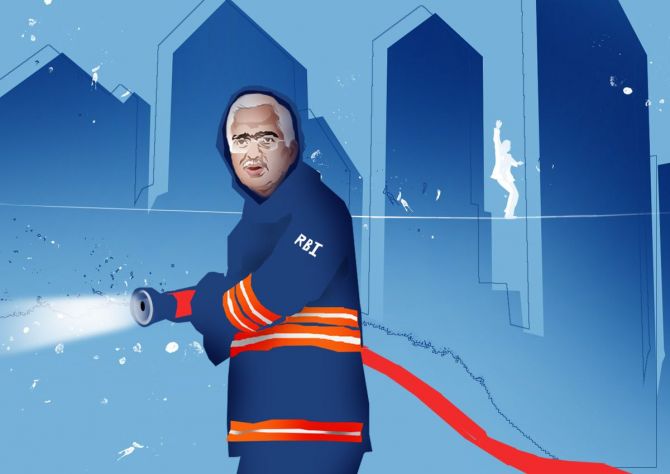Why is the RBI harsh on Paytm Payments Bank?
Why did it give Rana Kapoor of Yes Bank Ltd such a long rope?
Often, it's a long investigation process, but the RBI doesn't discuss this openly since that can threaten financial sector stability, explains Tamal Bandyopadhyay.

Are the shadows lengthening on India's shadow banking industry?
The hard fact is that the regulator has changed the way it approached supervision in the past. Having seen two large houses gutted, it is focusing on regular drills to prevent a fire from breaking out
Ahead of Holi, the festival of colours, I visited a banker friend for lunch over the weekend. He lives in a modern housing society in Mumbai.
A majority of its residents are finance professionals -- commercial and investment bankers, treasury managers, senior executives of insurance firms and mutual funds.
Quite a few of them were invited to the lunch hosted at his sprawling apartment, flaunting a lovely balcony overlooking the sea.
I hadn't even tasted the delicious looking Achari Paneer Rikka and sweet potato pineapple Dahi Puri Chaat (it was a vegetarian meal) when an ear-piercing alarm sounded.
Oh God! Just a few weeks ago, a massive fire had broken out in a building near Grant Road station, a bustling neighbourhood in south Mumbai. Half a dozen fire engines had rushed to the spot.
Before that, in the last week of January, a massive blaze had erupted in a seven-storey timber market in the same area, causing death and destruction. It had taken the fire brigade 18 hours to douse it.
I was about to rush out when the community of bankers asked me to relax. It was a routine fire drill conducted by the society at regular intervals round the year.
The housing society plans this drill meticulously, with multiple steps: The residents are alerted; the evacuation procedures are laid down; and there are designated safe assembly points.
Such alarms are used to conduct a trial evacuation over lazy weekends every once in a while. The emergency exits are checked to ensure they are not obstructed.
To prevent these drills from becoming too 'routine' an affair, they also switch the evacuation scenario.
At times, someone stands at a particular exit with a sign reading 'Exit Blocked' to simulate a potential situation and force the residents to react.
As we went back to focus on our lunch, my friend quipped with a naughty smile, 'We manage the housing society the way the RBI manages the financial sector. We don't want to call the fire brigade to douse the fire; we don't want the fire to break out. Prevention is better than cure.'
At that time, I took it as a commercial banker's joke about central banking. But, while I was preparing for a nap after the lovely lunch in a quiet corner, I realised there was merit in what he said.
Yes, this seems to be the mission of the RBI. It doesn't want to see a house on fire and call the fire brigade; instead, it wants to ensure that no fire breaks out.
The recent actions against some of the regulated entities point to this.
March 15 was the last day of the Paytm Payments Bank Ltd.
Ahead of that, in the first week of March, the RBI imposed an embargo on IIFL Finance Ltd's gold loan business, citing multiple supervisory concerns on deviation in assaying and certifying the purity of gold while sanctioning loans, non-adherence to the standard auction process for recovering bad loans, breaches in the loan-to-value ratio, unfair charges, and higher cash collections.
'Over the last few months, the RBI has been engaging with the senior management and the statutory auditors of the company on these deficiencies; however, no meaningful corrective action has been evidenced so far. This has necessitated the imposition of business restrictions with immediate effect, in the overall interest of customers,' an RBI release reads.
Essentially, the standard of underwriting, risk-management and compliance of the company doesn't seem to inspire the regulator's confidence even as the management doesn't admit to any governance issues.
The company's gold loan portfolio was Rs 24,700 crore (Rs 246 billion) in December 2023, close to one-third of the overall assets under management.
The RBI has also directed JM Financial Products Ltd to cease and desist, with immediate effect, from doing any form of financing against shares and debentures, including sanction and disbursal of loans against the initial public offering (IPO) of shares and also against subscription to debentures.
The extreme action followed multiple serious deficiencies observed in the company's IPO and debt subscription financing business.
'Apart from being in violation of regulatory guidelines, there are serious concerns on governance issues in the company, which in our assessment are detrimental to the interest of the customers,' the RBI said.
JM Financial is not happy with the regulator's decision. It strongly believes that there have been no material deficiencies in its loan sanctioning process.
It has also made it clear that 'there have been no governance issues whatsoever'.
Months before these actions, in November 2023, the RBI had directed Bajaj Finance Ltd to stop sanctioning and disbursing loans under its two lending products, eCOM and Insta EMI Card, with immediate effect.
This action was necessitated due to the company's non-adherence to the extant provisions of digital lending guidelines, the RBI said.
At the risk of sounding dramatic, we can say that the shadows are lengthening on India's shadow banking industry.
The hard fact is that the regulator has changed the way it approached supervision in the past.
Having seen two large houses gutted, it is focusing on regular drills to prevent a fire from breaking out.
In late 2018, heavyweight infrastructure lender Infrastructure Leasing & Financial Services Ltd (IL&FS) went bust after it failed to meet two repayment obligations.
Sixteen days after the IL&FS default, then the fourth-largest mortgage financier among non-banking financial companies, Dewan Housing Finance Corporation Ltd (DHFL) had a date with destiny.
A large mutual fund sold the DHFL commercial paper at a steep discount, creating panic in the market, leading to a 60 per cent intraday fall in DHFL share price.
The company managed to continue for a few months till it missed interest payment on a debt issue and was downgraded to default category in June 2019.
By that time, the last general elections were over and a new government (National Democratic Alliance-2) was in place.
The RBI's new-found enthusiasm for punishing the naughty boys needs to be seen in the right context.
This is the time to do so since the resilience of the financial sector is at its peak.
The level of non-performing assets on banks' books, as a percentage of overall loan assets, is at a historic low.
Besides, their provision coverage ratio (the amount of money set aside to take care of bad assets) has been on the rise. Also, the banks are well capitalised.
When did we last see such a healthy Indian banking system? Smart regulators take tough calls when the going is good.
Often, it's a catch-22 situation for the regulator. On the one hand, if it takes hard actions against regulated entities even for the right reasons, it runs the risk of being called aggressive.
On the other hand, if it's not fast in taking action, it earns the sobriquet of being sloppy.
Why is the RBI harsh on Paytm Payments Bank? Why did it give Rana Kapoor of Yes Bank Ltd such a long rope?
Such questions are often asked because we are not aware of the work that goes into catching the naughty boys.
Often, the investigation process to fix accountability is long. And, the regulator doesn't discuss this openly since that can threaten financial sector stability. There cannot be any teaser. We get to know the story only when the RBI makes the action public.
With elections round the corner, there may not be any more slaps on big boys' faces for now.
The action will probably resume after the new government is in place. Let's wait and watch.
Tamal Bandyopadhyay is an author and senior advisor to the Jana Small Finance Bank Ltd. His latest book is Roller Coaster: An Affair with Banking .
Disclaimer: These are Tamal Bandyopadhyay's personal views.
Feature Presentation: Rajesh Alva/Rediff.com











